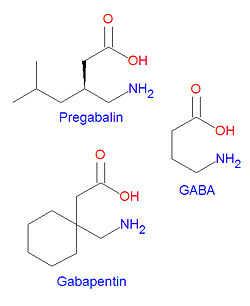Pregabalin
Pregabalin is structurally similar to gabapentin. It is also similar to the inhibitory neurotransmitter gamma-aminobutyric acid (GABA), and although it does not act on GABA receptors, it may increase the "density of GABA transporter protein and increases the rate of functional GABA transport".[1] It is approved by the FDA for neuropathic pain associated with diabetic peripheral neuropathy, postherpetic neuralgia adjunctive therapy for adult patients with partial onset seizures, and fibromyalgia.[1]
chemistry
The IUPAC chemical name for pregabalin is (S)-(+)-3-(aminomethyl)-5-methylhexanoic acid. Its chemical formula is C8H17NO2 giving it a molecular mass of 159.23 g/mol. It is both an amine and a carboxylic acid.
External links
The most up-to-date information about Pregabalin and other drugs can be found at the following sites.
- Pregabalin - FDA approved drug information (drug label) from DailyMed (U.S. National Library of Medicine).
- Pregabalin - Drug information for consumers from MedlinePlus (U.S. National Library of Medicine).
- Pregabalin - Detailed information from DrugBank.
References
- ↑ 1.0 1.1 The most up-to-date information about Pregabalin and other drugs can be found at the following sites.
- Pregabalin - FDA approved drug information (drug label) from DailyMed (U.S. National Library of Medicine).
- Pregabalin - Drug information for consumers from MedlinePlus (U.S. National Library of Medicine).
- Pregabalin - Detailed information from DrugBank.
